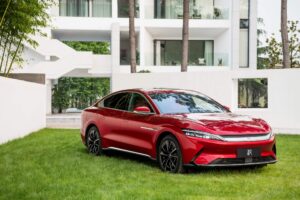The Electric Vehicle Revolution: Why China is Leaving the U.S. Behind

The electric vehicle (EV) market has experienced explosive growth in recent years, yet not every player is thriving in this rapid shift. Peter Rawlinson, CEO of Lucid Motors and former engineering vice president at Tesla, recently highlighted the challenges facing American automakers. He claims they are mired in an EV "valley of death," stating, “frankly, American EVs suck.” This candid assessment raises critical questions about the current state of EV technology in the U.S. compared to their Chinese counterparts.
China’s Strategic Advantage
As Rawlinson noted, China has made significant strides in EV technology and affordability, benefitting from a government that can mobilize resources in a unified direction. Since 2009, China has injected over $230 billion into its burgeoning EV sector, building a competitive ecosystem that allows firms like BYD to dominate the market. "They have a fundamental advantage," he remarked, indicating not only a technological edge but also a synergistic industrial approach that optimizes production.
Despite concerns over Chinese technology—specifically in terms of core powertrain systems—Rawlinson emphasizes the importance of not underestimating Chinese manufacturers. Their capacity to produce affordable EVs positions them favorably against their U.S. competitors, who often carry higher overhead costs due to less streamlined supply chains.
The High Cost of American EVs
The entry price of quality American EVs has limited their adoption among consumers. Lucid’s upcoming electric SUV, the Gravity, carries a hefty price tag of $94,900. While the company aims to deliver high-quality products, this steep cost appeals to only a niche market, leaving the average consumer in search of alternatives.
Stellantis CEO Carlos Tavares has echoed similar sentiments. He drew comparisons to the Japanese automotive surge in the 1970s, suggesting that Chinese EVs could soon experience a similar reception within the U.S. However, the key difference lies in the current economic conditions, where affordability is paramount.
The Unsung Costs of EV Ownership
Batteries make up about 40% of the total EV cost, a significant hurdle for many manufacturers. Unlike American companies, Chinese firms like BYD have vertically integrated operations, allowing them to construct batteries from raw materials to finished products efficiently. This streamlined approach enables them to offer models such as:
- BYD Seagull EV Honor Edition starting at $9,700
- BYD Dolphin EV Honor priced at $13,900
- BYD Yuan Electric SUV available for $16,600
In comparison, these prices are astronomical in the U.S. market, especially for a new vehicle of any type, let alone an electric one.
Barriers to Entry
Despite a pronounced interest in reducing fossil fuel dependency, policies surrounding tariffs are stifling competition from affordable and quality Chinese EVs in Western markets. If lawmakers genuinely aimed to address emissions, they would consider removing prohibitive tariffs on imported Chinese EVs, allowing consumers access to these cost-effective alternatives.
Instead, consumers are left with a paradox: they are encouraged to incur substantial debt to purchase expensive EVs that might not fulfill their true needs, all while more affordable options exist beyond their reach. This disconnect highlights a critical issue at the intersection of consumer demand, policy enforcement, and industry dynamics.
Conclusion: The Future of EVs
As the global race to dominate the electric vehicle sector intensifies, it becomes increasingly clear that affordability and accessibility will define who wins. The challenges faced by American manufacturers like Lucid Motors underscore a larger narrative in which consumer choices are influenced not only by technology and quality but also by strategic economic policy.
At Extreme Investor Network, we believe it’s vital to keep a close eye on developments in the EV sector. The competitive landscape is shifting rapidly, and understanding these dynamics will empower consumers and investors alike to make informed decisions as the journey towards electrification continues. The road to a sustainable future may be paved with challenges, but it also opens the door to incredible opportunities. Stay tuned as we explore what lies ahead in the world of electric vehicles!

